Tourism Policy and Management: TIABC's Recommendations and Analysis
VerifiedAdded on 2023/05/28
|5
|2045
|90
Report
AI Summary
This report analyzes the policy instruments used by the Tourism Industry Association of British Columbia (TIABC) to address the issue of affordable accommodation for tourism workers, focusing on short-term rentals (STRs). The report examines the TIABC's recommendations, which include urging civic and provincial governments to implement regulations. It compares policies at municipal and provincial levels, highlighting the implications of these policies. The report also discusses additional policies, such as partnerships and crackdowns on fraud, that could help address the housing crisis. The analysis includes a review of relevant literature and considers factors like taxation, regulations, and housing market dynamics to provide a comprehensive overview of the challenges and potential solutions for the tourism industry in British Columbia.
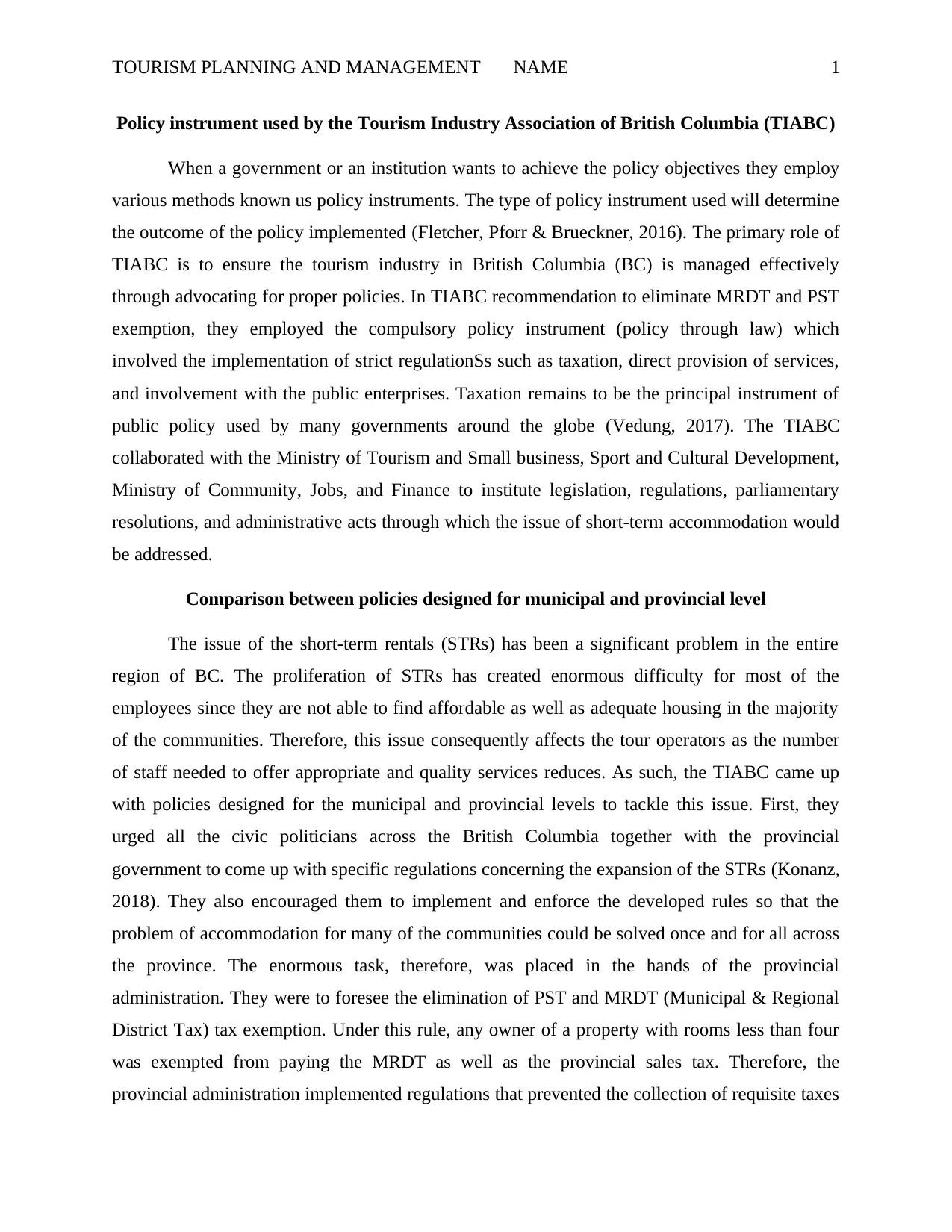
TOURISM PLANNING AND MANAGEMENT NAME 1
Policy instrument used by the Tourism Industry Association of British Columbia (TIABC)
When a government or an institution wants to achieve the policy objectives they employ
various methods known us policy instruments. The type of policy instrument used will determine
the outcome of the policy implemented (Fletcher, Pforr & Brueckner, 2016). The primary role of
TIABC is to ensure the tourism industry in British Columbia (BC) is managed effectively
through advocating for proper policies. In TIABC recommendation to eliminate MRDT and PST
exemption, they employed the compulsory policy instrument (policy through law) which
involved the implementation of strict regulationSs such as taxation, direct provision of services,
and involvement with the public enterprises. Taxation remains to be the principal instrument of
public policy used by many governments around the globe (Vedung, 2017). The TIABC
collaborated with the Ministry of Tourism and Small business, Sport and Cultural Development,
Ministry of Community, Jobs, and Finance to institute legislation, regulations, parliamentary
resolutions, and administrative acts through which the issue of short-term accommodation would
be addressed.
Comparison between policies designed for municipal and provincial level
The issue of the short-term rentals (STRs) has been a significant problem in the entire
region of BC. The proliferation of STRs has created enormous difficulty for most of the
employees since they are not able to find affordable as well as adequate housing in the majority
of the communities. Therefore, this issue consequently affects the tour operators as the number
of staff needed to offer appropriate and quality services reduces. As such, the TIABC came up
with policies designed for the municipal and provincial levels to tackle this issue. First, they
urged all the civic politicians across the British Columbia together with the provincial
government to come up with specific regulations concerning the expansion of the STRs (Konanz,
2018). They also encouraged them to implement and enforce the developed rules so that the
problem of accommodation for many of the communities could be solved once and for all across
the province. The enormous task, therefore, was placed in the hands of the provincial
administration. They were to foresee the elimination of PST and MRDT (Municipal & Regional
District Tax) tax exemption. Under this rule, any owner of a property with rooms less than four
was exempted from paying the MRDT as well as the provincial sales tax. Therefore, the
provincial administration implemented regulations that prevented the collection of requisite taxes
Policy instrument used by the Tourism Industry Association of British Columbia (TIABC)
When a government or an institution wants to achieve the policy objectives they employ
various methods known us policy instruments. The type of policy instrument used will determine
the outcome of the policy implemented (Fletcher, Pforr & Brueckner, 2016). The primary role of
TIABC is to ensure the tourism industry in British Columbia (BC) is managed effectively
through advocating for proper policies. In TIABC recommendation to eliminate MRDT and PST
exemption, they employed the compulsory policy instrument (policy through law) which
involved the implementation of strict regulationSs such as taxation, direct provision of services,
and involvement with the public enterprises. Taxation remains to be the principal instrument of
public policy used by many governments around the globe (Vedung, 2017). The TIABC
collaborated with the Ministry of Tourism and Small business, Sport and Cultural Development,
Ministry of Community, Jobs, and Finance to institute legislation, regulations, parliamentary
resolutions, and administrative acts through which the issue of short-term accommodation would
be addressed.
Comparison between policies designed for municipal and provincial level
The issue of the short-term rentals (STRs) has been a significant problem in the entire
region of BC. The proliferation of STRs has created enormous difficulty for most of the
employees since they are not able to find affordable as well as adequate housing in the majority
of the communities. Therefore, this issue consequently affects the tour operators as the number
of staff needed to offer appropriate and quality services reduces. As such, the TIABC came up
with policies designed for the municipal and provincial levels to tackle this issue. First, they
urged all the civic politicians across the British Columbia together with the provincial
government to come up with specific regulations concerning the expansion of the STRs (Konanz,
2018). They also encouraged them to implement and enforce the developed rules so that the
problem of accommodation for many of the communities could be solved once and for all across
the province. The enormous task, therefore, was placed in the hands of the provincial
administration. They were to foresee the elimination of PST and MRDT (Municipal & Regional
District Tax) tax exemption. Under this rule, any owner of a property with rooms less than four
was exempted from paying the MRDT as well as the provincial sales tax. Therefore, the
provincial administration implemented regulations that prevented the collection of requisite taxes
Paraphrase This Document
Need a fresh take? Get an instant paraphrase of this document with our AI Paraphraser
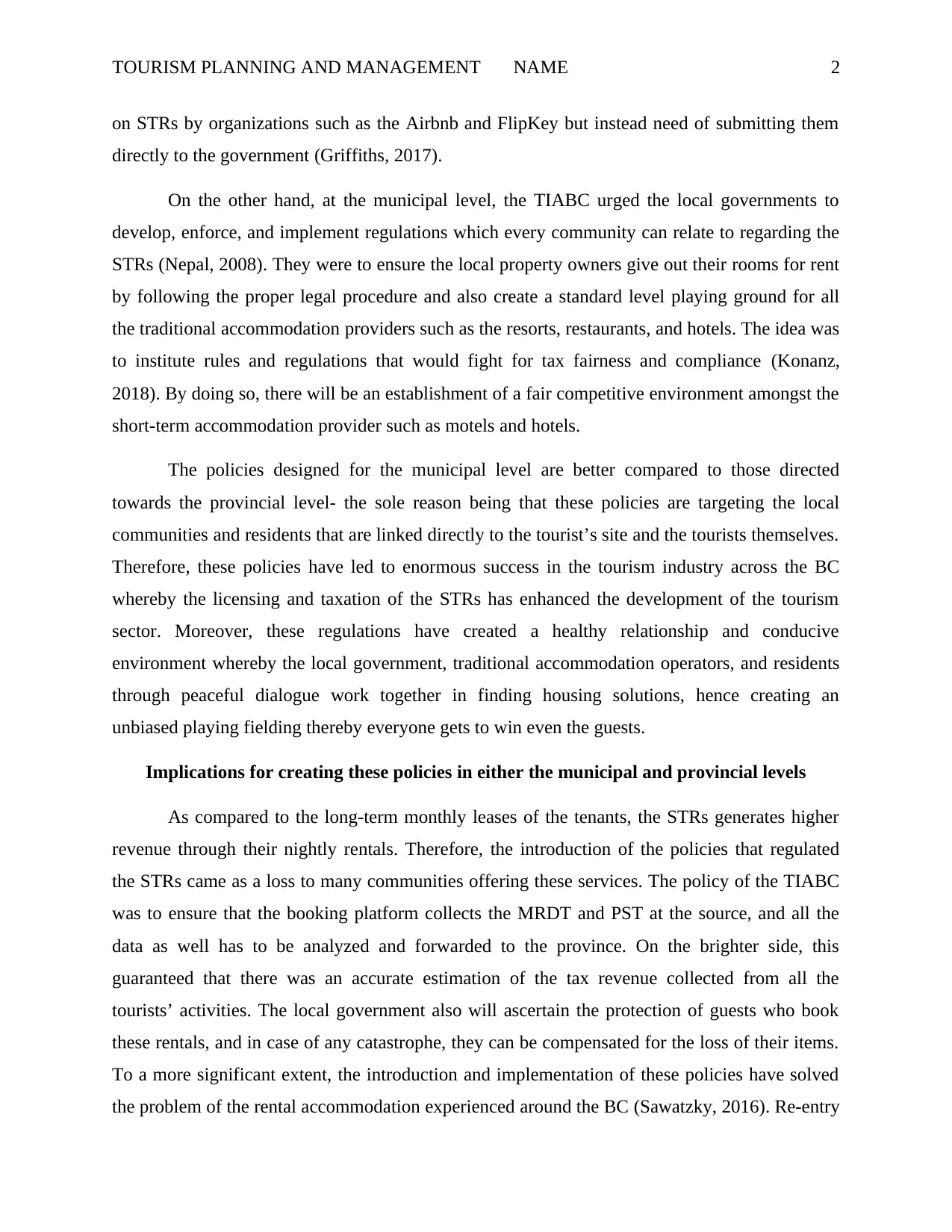
TOURISM PLANNING AND MANAGEMENT NAME 2
on STRs by organizations such as the Airbnb and FlipKey but instead need of submitting them
directly to the government (Griffiths, 2017).
On the other hand, at the municipal level, the TIABC urged the local governments to
develop, enforce, and implement regulations which every community can relate to regarding the
STRs (Nepal, 2008). They were to ensure the local property owners give out their rooms for rent
by following the proper legal procedure and also create a standard level playing ground for all
the traditional accommodation providers such as the resorts, restaurants, and hotels. The idea was
to institute rules and regulations that would fight for tax fairness and compliance (Konanz,
2018). By doing so, there will be an establishment of a fair competitive environment amongst the
short-term accommodation provider such as motels and hotels.
The policies designed for the municipal level are better compared to those directed
towards the provincial level- the sole reason being that these policies are targeting the local
communities and residents that are linked directly to the tourist’s site and the tourists themselves.
Therefore, these policies have led to enormous success in the tourism industry across the BC
whereby the licensing and taxation of the STRs has enhanced the development of the tourism
sector. Moreover, these regulations have created a healthy relationship and conducive
environment whereby the local government, traditional accommodation operators, and residents
through peaceful dialogue work together in finding housing solutions, hence creating an
unbiased playing fielding thereby everyone gets to win even the guests.
Implications for creating these policies in either the municipal and provincial levels
As compared to the long-term monthly leases of the tenants, the STRs generates higher
revenue through their nightly rentals. Therefore, the introduction of the policies that regulated
the STRs came as a loss to many communities offering these services. The policy of the TIABC
was to ensure that the booking platform collects the MRDT and PST at the source, and all the
data as well has to be analyzed and forwarded to the province. On the brighter side, this
guaranteed that there was an accurate estimation of the tax revenue collected from all the
tourists’ activities. The local government also will ascertain the protection of guests who book
these rentals, and in case of any catastrophe, they can be compensated for the loss of their items.
To a more significant extent, the introduction and implementation of these policies have solved
the problem of the rental accommodation experienced around the BC (Sawatzky, 2016). Re-entry
on STRs by organizations such as the Airbnb and FlipKey but instead need of submitting them
directly to the government (Griffiths, 2017).
On the other hand, at the municipal level, the TIABC urged the local governments to
develop, enforce, and implement regulations which every community can relate to regarding the
STRs (Nepal, 2008). They were to ensure the local property owners give out their rooms for rent
by following the proper legal procedure and also create a standard level playing ground for all
the traditional accommodation providers such as the resorts, restaurants, and hotels. The idea was
to institute rules and regulations that would fight for tax fairness and compliance (Konanz,
2018). By doing so, there will be an establishment of a fair competitive environment amongst the
short-term accommodation provider such as motels and hotels.
The policies designed for the municipal level are better compared to those directed
towards the provincial level- the sole reason being that these policies are targeting the local
communities and residents that are linked directly to the tourist’s site and the tourists themselves.
Therefore, these policies have led to enormous success in the tourism industry across the BC
whereby the licensing and taxation of the STRs has enhanced the development of the tourism
sector. Moreover, these regulations have created a healthy relationship and conducive
environment whereby the local government, traditional accommodation operators, and residents
through peaceful dialogue work together in finding housing solutions, hence creating an
unbiased playing fielding thereby everyone gets to win even the guests.
Implications for creating these policies in either the municipal and provincial levels
As compared to the long-term monthly leases of the tenants, the STRs generates higher
revenue through their nightly rentals. Therefore, the introduction of the policies that regulated
the STRs came as a loss to many communities offering these services. The policy of the TIABC
was to ensure that the booking platform collects the MRDT and PST at the source, and all the
data as well has to be analyzed and forwarded to the province. On the brighter side, this
guaranteed that there was an accurate estimation of the tax revenue collected from all the
tourists’ activities. The local government also will ascertain the protection of guests who book
these rentals, and in case of any catastrophe, they can be compensated for the loss of their items.
To a more significant extent, the introduction and implementation of these policies have solved
the problem of the rental accommodation experienced around the BC (Sawatzky, 2016). Re-entry
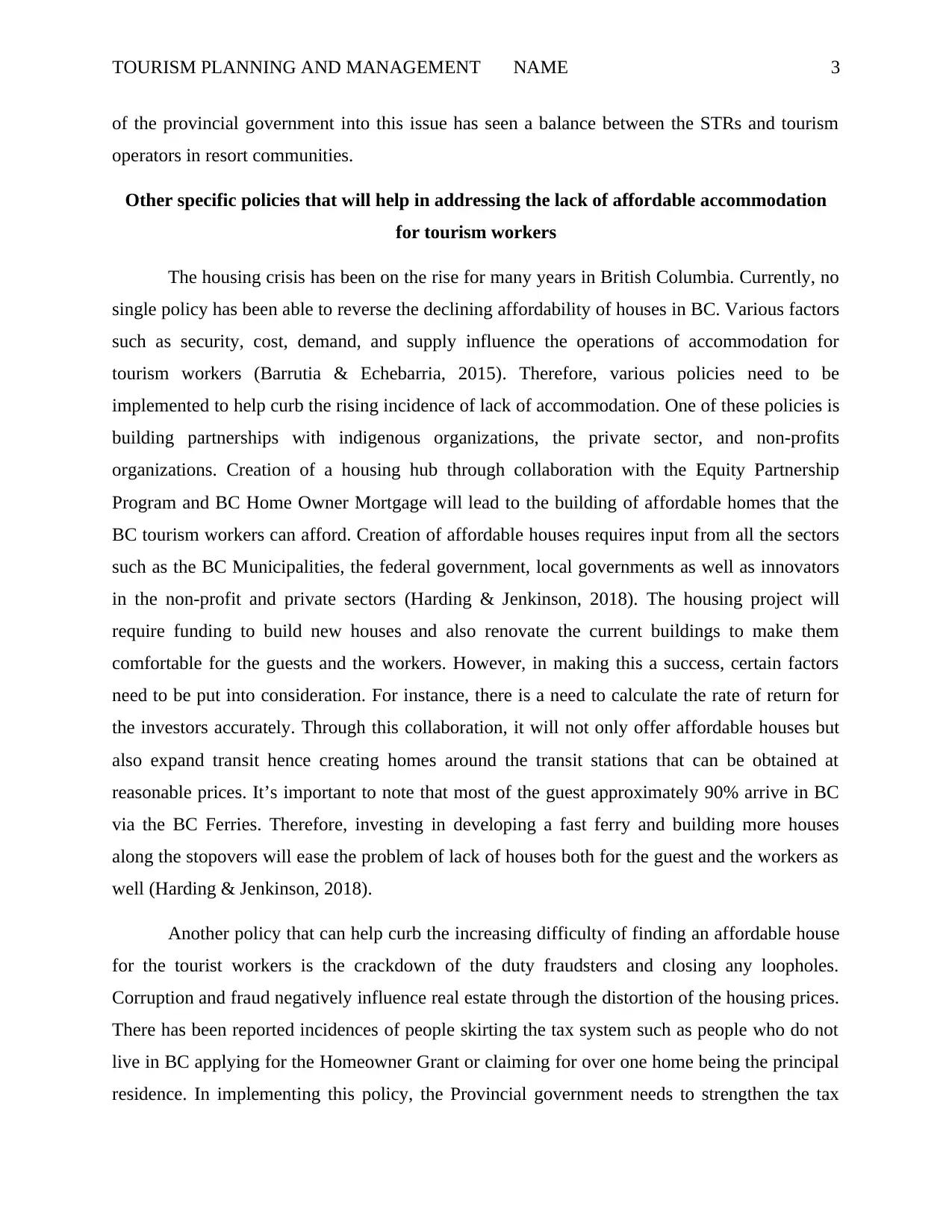
TOURISM PLANNING AND MANAGEMENT NAME 3
of the provincial government into this issue has seen a balance between the STRs and tourism
operators in resort communities.
Other specific policies that will help in addressing the lack of affordable accommodation
for tourism workers
The housing crisis has been on the rise for many years in British Columbia. Currently, no
single policy has been able to reverse the declining affordability of houses in BC. Various factors
such as security, cost, demand, and supply influence the operations of accommodation for
tourism workers (Barrutia & Echebarria, 2015). Therefore, various policies need to be
implemented to help curb the rising incidence of lack of accommodation. One of these policies is
building partnerships with indigenous organizations, the private sector, and non-profits
organizations. Creation of a housing hub through collaboration with the Equity Partnership
Program and BC Home Owner Mortgage will lead to the building of affordable homes that the
BC tourism workers can afford. Creation of affordable houses requires input from all the sectors
such as the BC Municipalities, the federal government, local governments as well as innovators
in the non-profit and private sectors (Harding & Jenkinson, 2018). The housing project will
require funding to build new houses and also renovate the current buildings to make them
comfortable for the guests and the workers. However, in making this a success, certain factors
need to be put into consideration. For instance, there is a need to calculate the rate of return for
the investors accurately. Through this collaboration, it will not only offer affordable houses but
also expand transit hence creating homes around the transit stations that can be obtained at
reasonable prices. It’s important to note that most of the guest approximately 90% arrive in BC
via the BC Ferries. Therefore, investing in developing a fast ferry and building more houses
along the stopovers will ease the problem of lack of houses both for the guest and the workers as
well (Harding & Jenkinson, 2018).
Another policy that can help curb the increasing difficulty of finding an affordable house
for the tourist workers is the crackdown of the duty fraudsters and closing any loopholes.
Corruption and fraud negatively influence real estate through the distortion of the housing prices.
There has been reported incidences of people skirting the tax system such as people who do not
live in BC applying for the Homeowner Grant or claiming for over one home being the principal
residence. In implementing this policy, the Provincial government needs to strengthen the tax
of the provincial government into this issue has seen a balance between the STRs and tourism
operators in resort communities.
Other specific policies that will help in addressing the lack of affordable accommodation
for tourism workers
The housing crisis has been on the rise for many years in British Columbia. Currently, no
single policy has been able to reverse the declining affordability of houses in BC. Various factors
such as security, cost, demand, and supply influence the operations of accommodation for
tourism workers (Barrutia & Echebarria, 2015). Therefore, various policies need to be
implemented to help curb the rising incidence of lack of accommodation. One of these policies is
building partnerships with indigenous organizations, the private sector, and non-profits
organizations. Creation of a housing hub through collaboration with the Equity Partnership
Program and BC Home Owner Mortgage will lead to the building of affordable homes that the
BC tourism workers can afford. Creation of affordable houses requires input from all the sectors
such as the BC Municipalities, the federal government, local governments as well as innovators
in the non-profit and private sectors (Harding & Jenkinson, 2018). The housing project will
require funding to build new houses and also renovate the current buildings to make them
comfortable for the guests and the workers. However, in making this a success, certain factors
need to be put into consideration. For instance, there is a need to calculate the rate of return for
the investors accurately. Through this collaboration, it will not only offer affordable houses but
also expand transit hence creating homes around the transit stations that can be obtained at
reasonable prices. It’s important to note that most of the guest approximately 90% arrive in BC
via the BC Ferries. Therefore, investing in developing a fast ferry and building more houses
along the stopovers will ease the problem of lack of houses both for the guest and the workers as
well (Harding & Jenkinson, 2018).
Another policy that can help curb the increasing difficulty of finding an affordable house
for the tourist workers is the crackdown of the duty fraudsters and closing any loopholes.
Corruption and fraud negatively influence real estate through the distortion of the housing prices.
There has been reported incidences of people skirting the tax system such as people who do not
live in BC applying for the Homeowner Grant or claiming for over one home being the principal
residence. In implementing this policy, the Provincial government needs to strengthen the tax
⊘ This is a preview!⊘
Do you want full access?
Subscribe today to unlock all pages.

Trusted by 1+ million students worldwide
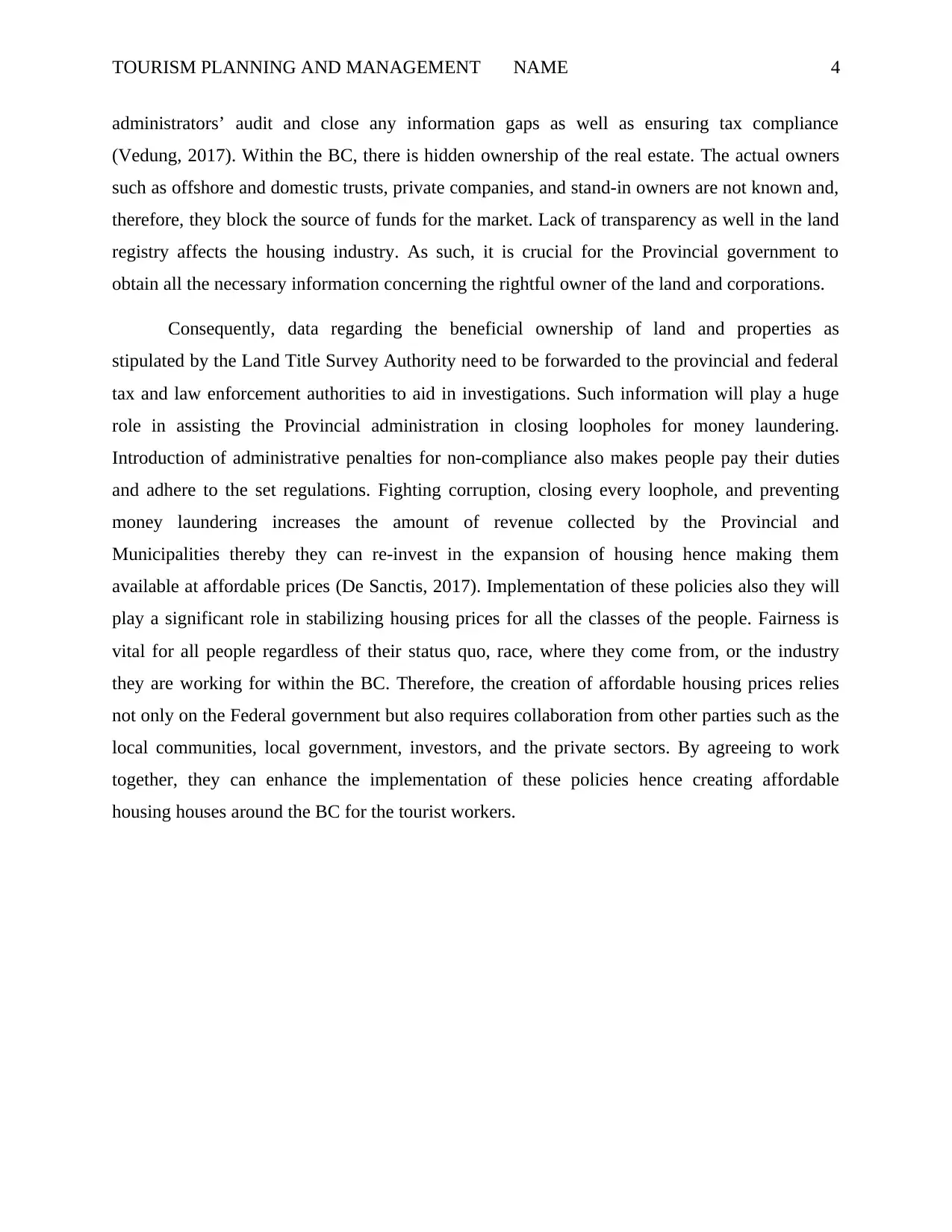
TOURISM PLANNING AND MANAGEMENT NAME 4
administrators’ audit and close any information gaps as well as ensuring tax compliance
(Vedung, 2017). Within the BC, there is hidden ownership of the real estate. The actual owners
such as offshore and domestic trusts, private companies, and stand-in owners are not known and,
therefore, they block the source of funds for the market. Lack of transparency as well in the land
registry affects the housing industry. As such, it is crucial for the Provincial government to
obtain all the necessary information concerning the rightful owner of the land and corporations.
Consequently, data regarding the beneficial ownership of land and properties as
stipulated by the Land Title Survey Authority need to be forwarded to the provincial and federal
tax and law enforcement authorities to aid in investigations. Such information will play a huge
role in assisting the Provincial administration in closing loopholes for money laundering.
Introduction of administrative penalties for non-compliance also makes people pay their duties
and adhere to the set regulations. Fighting corruption, closing every loophole, and preventing
money laundering increases the amount of revenue collected by the Provincial and
Municipalities thereby they can re-invest in the expansion of housing hence making them
available at affordable prices (De Sanctis, 2017). Implementation of these policies also they will
play a significant role in stabilizing housing prices for all the classes of the people. Fairness is
vital for all people regardless of their status quo, race, where they come from, or the industry
they are working for within the BC. Therefore, the creation of affordable housing prices relies
not only on the Federal government but also requires collaboration from other parties such as the
local communities, local government, investors, and the private sectors. By agreeing to work
together, they can enhance the implementation of these policies hence creating affordable
housing houses around the BC for the tourist workers.
administrators’ audit and close any information gaps as well as ensuring tax compliance
(Vedung, 2017). Within the BC, there is hidden ownership of the real estate. The actual owners
such as offshore and domestic trusts, private companies, and stand-in owners are not known and,
therefore, they block the source of funds for the market. Lack of transparency as well in the land
registry affects the housing industry. As such, it is crucial for the Provincial government to
obtain all the necessary information concerning the rightful owner of the land and corporations.
Consequently, data regarding the beneficial ownership of land and properties as
stipulated by the Land Title Survey Authority need to be forwarded to the provincial and federal
tax and law enforcement authorities to aid in investigations. Such information will play a huge
role in assisting the Provincial administration in closing loopholes for money laundering.
Introduction of administrative penalties for non-compliance also makes people pay their duties
and adhere to the set regulations. Fighting corruption, closing every loophole, and preventing
money laundering increases the amount of revenue collected by the Provincial and
Municipalities thereby they can re-invest in the expansion of housing hence making them
available at affordable prices (De Sanctis, 2017). Implementation of these policies also they will
play a significant role in stabilizing housing prices for all the classes of the people. Fairness is
vital for all people regardless of their status quo, race, where they come from, or the industry
they are working for within the BC. Therefore, the creation of affordable housing prices relies
not only on the Federal government but also requires collaboration from other parties such as the
local communities, local government, investors, and the private sectors. By agreeing to work
together, they can enhance the implementation of these policies hence creating affordable
housing houses around the BC for the tourist workers.
Paraphrase This Document
Need a fresh take? Get an instant paraphrase of this document with our AI Paraphraser
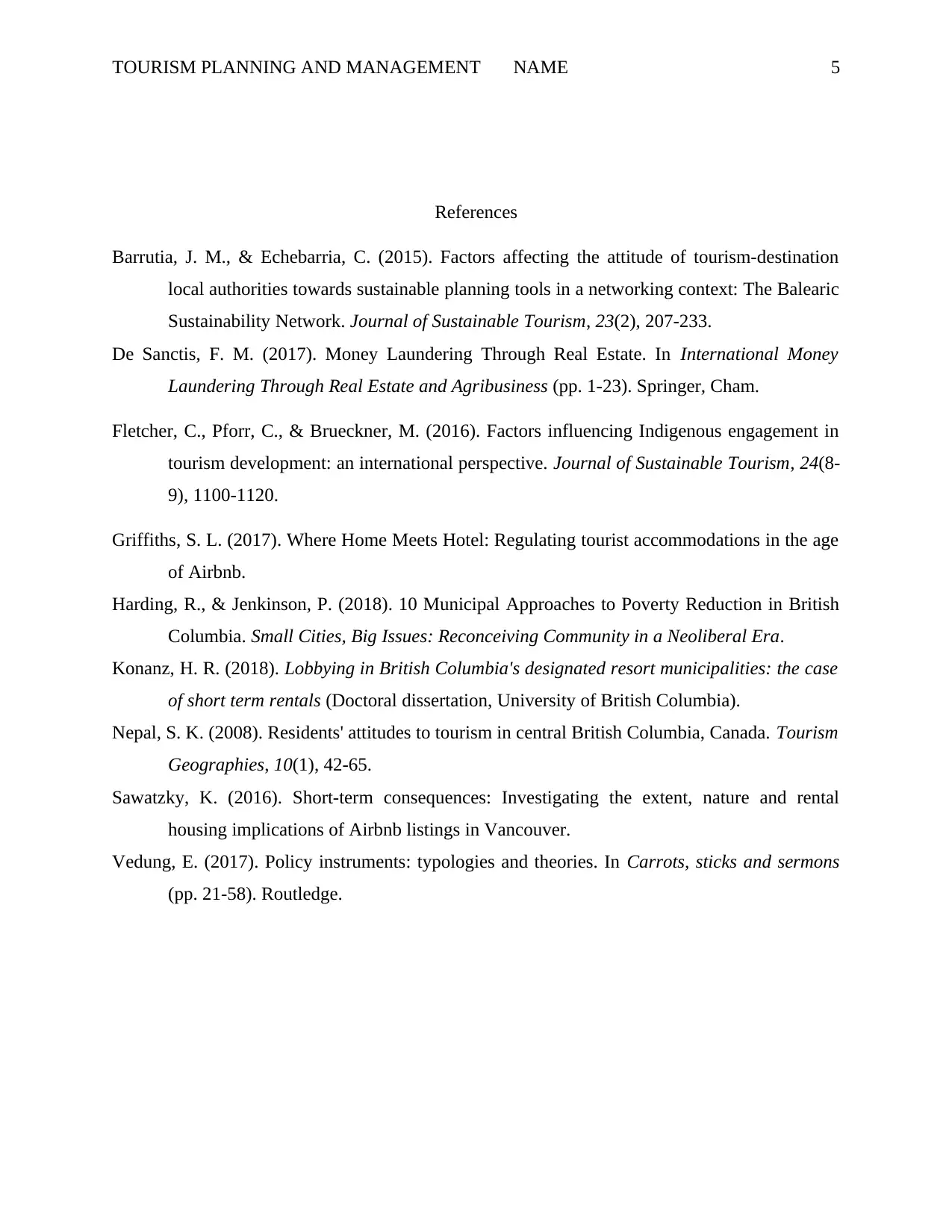
TOURISM PLANNING AND MANAGEMENT NAME 5
References
Barrutia, J. M., & Echebarria, C. (2015). Factors affecting the attitude of tourism-destination
local authorities towards sustainable planning tools in a networking context: The Balearic
Sustainability Network. Journal of Sustainable Tourism, 23(2), 207-233.
De Sanctis, F. M. (2017). Money Laundering Through Real Estate. In International Money
Laundering Through Real Estate and Agribusiness (pp. 1-23). Springer, Cham.
Fletcher, C., Pforr, C., & Brueckner, M. (2016). Factors influencing Indigenous engagement in
tourism development: an international perspective. Journal of Sustainable Tourism, 24(8-
9), 1100-1120.
Griffiths, S. L. (2017). Where Home Meets Hotel: Regulating tourist accommodations in the age
of Airbnb.
Harding, R., & Jenkinson, P. (2018). 10 Municipal Approaches to Poverty Reduction in British
Columbia. Small Cities, Big Issues: Reconceiving Community in a Neoliberal Era.
Konanz, H. R. (2018). Lobbying in British Columbia's designated resort municipalities: the case
of short term rentals (Doctoral dissertation, University of British Columbia).
Nepal, S. K. (2008). Residents' attitudes to tourism in central British Columbia, Canada. Tourism
Geographies, 10(1), 42-65.
Sawatzky, K. (2016). Short-term consequences: Investigating the extent, nature and rental
housing implications of Airbnb listings in Vancouver.
Vedung, E. (2017). Policy instruments: typologies and theories. In Carrots, sticks and sermons
(pp. 21-58). Routledge.
References
Barrutia, J. M., & Echebarria, C. (2015). Factors affecting the attitude of tourism-destination
local authorities towards sustainable planning tools in a networking context: The Balearic
Sustainability Network. Journal of Sustainable Tourism, 23(2), 207-233.
De Sanctis, F. M. (2017). Money Laundering Through Real Estate. In International Money
Laundering Through Real Estate and Agribusiness (pp. 1-23). Springer, Cham.
Fletcher, C., Pforr, C., & Brueckner, M. (2016). Factors influencing Indigenous engagement in
tourism development: an international perspective. Journal of Sustainable Tourism, 24(8-
9), 1100-1120.
Griffiths, S. L. (2017). Where Home Meets Hotel: Regulating tourist accommodations in the age
of Airbnb.
Harding, R., & Jenkinson, P. (2018). 10 Municipal Approaches to Poverty Reduction in British
Columbia. Small Cities, Big Issues: Reconceiving Community in a Neoliberal Era.
Konanz, H. R. (2018). Lobbying in British Columbia's designated resort municipalities: the case
of short term rentals (Doctoral dissertation, University of British Columbia).
Nepal, S. K. (2008). Residents' attitudes to tourism in central British Columbia, Canada. Tourism
Geographies, 10(1), 42-65.
Sawatzky, K. (2016). Short-term consequences: Investigating the extent, nature and rental
housing implications of Airbnb listings in Vancouver.
Vedung, E. (2017). Policy instruments: typologies and theories. In Carrots, sticks and sermons
(pp. 21-58). Routledge.
1 out of 5
Related Documents
Your All-in-One AI-Powered Toolkit for Academic Success.
+13062052269
info@desklib.com
Available 24*7 on WhatsApp / Email
![[object Object]](/_next/static/media/star-bottom.7253800d.svg)
Unlock your academic potential
Copyright © 2020–2025 A2Z Services. All Rights Reserved. Developed and managed by ZUCOL.





